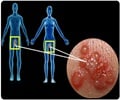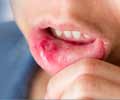Researchers at have found that the number of HIV infection cases among heterosexual non-injecting drug users in New York City was now greater than among people who inject drugs.

The increased efficiency for transmitting HIV occurs even when persons with herpes simplex virus 2 (HSV-2) are between outbreaks, as herpes increases both susceptibility to and transmissibility of HIV. More than half of the non-injecting drug users in the study were infected with HSV-2.
"Heterosexual intercourse is usually not very efficient for transmitting HIV, but the efficiency of heterosexual transmission nearly triples in the presence of herpes simplex virus type 2," notes the study's lead author, Don Des Jarlais, PhD, Deputy Director, Research Methods and Infectious Diseases Cores, Center for Drug Use and HIV Research (CDUHR) and Professor of Psychiatry and of Preventive Medicine at Mount Sinai Beth Israel. "In New York City, we have done an excellent job of reducing HIV among persons who inject drugs and we must now put more efforts into reducing sexual transmission associated with non-injecting drug use."
The study concludes that an increase in HIV infection among these non-injecting drug users is better considered as an increase in HSV- 2/HIV co-infection rather than simply an increase in HIV prevalence. Additional interventions (such as treatment as prevention and pre-exposure prophylaxis) are needed to reduce further HIV transmission from HSV-2/HIV co-infected non-injecting drug users.
The City Department of Health and Mental Hygiene has initiated a program "treatment as prevention," in which HIV infected persons are given anti-viral medications to both protect their own health and to reduce the chances that they will transmit HIV to others. There are also new federal recommendations to provide anti-retroviral medications to HIV uninfected persons at high risk for becoming infected.
"If we can implement these programs on a large scale, we should be able to control sexual transmission of HIV in the city, and achieve the goal of an "End to the AIDS Epidemic," said Dr. Des Jarlais.
Source-Eurekalert
 MEDINDIA
MEDINDIA



 Email
Email









